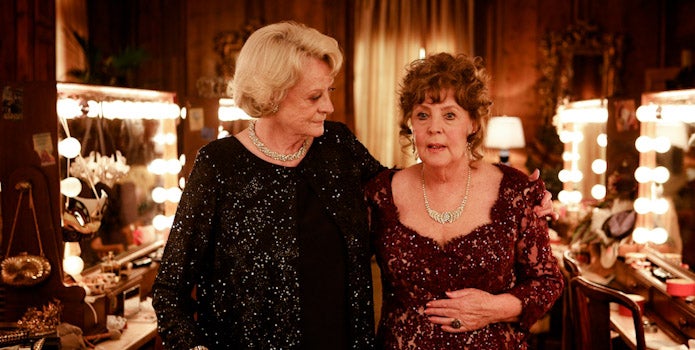We don't need more films for old people. We just need more good films
A week in arts: Why Dame Maggie Smith is wrong about Hollywood, it's not about the economy stupid and anonymous art at the Frieze Art Fair


One certainty of the thespian life is that, when actresses reach a certain age, they will lament the lack of roles for older actresses. The estimable Patricia Hodge has added a new twist to this. In voicing the lament recently, she added that there always seemed to be roles for the holy trinity of Maggie Smith, Judi Dench and Vanessa Redgrave. It was the rest of the women of a certain age who were feeling deprived. I look to Julian Fellowes to bring some happiness here. He has already brought Shirley MacLaine across the Atlantic. Now he must be patriotic and introduce a host of aunts and great aunts, all with some vicarious claim to the Downton estate, or maybe old flames of Hugh Bonneville's Lord Grantham arriving to shame him into coming clean.
This week Dame Maggie herself gave a twist to the debate, saying Hollywood should make more films for "elderly people". Speaking at the premiere of the film Quartet, she said: "It seems to me there is a change in what audiences want to see," she said. "I can only hope that's correct, because there's an awful lot of people of my age around now and we outnumber the others. I don't think films about elderly people have been made very much. But I think of [films like] Cocoon and Driving Miss Daisy and they always seem to be fairly successful, so it's a bit baffling as to why everybody has to be treated as if they were five years old."
She may have momentarily forgotten her excellent cameos as Professor Minerva McGonagall in a certain children's franchise. But it didn't matter too much what Dame Maggie said, the fascinating fact was that she said anything. Dame Maggie's public utterances are so rare, she makes Bob Dylan look a positive chatterbox. So every word from this national treasure is treasured. But on this occasion she may only be half right. Of course, Hollywood has long needed to grow up and make more films which address real concerns. But, what with Dame Maggie's new film Quartet, The Best Exotic Marigold Hotel, and several other contemporary vehicles about old age, the baby boomers are actually having a mini-boom.
The bigger point, though, is that I feel she is wrong to assume that audiences, whatever their age, only want a mirror of their own lives in art, be it film, theatre or TV. A good work of art is likely to be seen by an audience embracing more than one demographic. At a good film one should be able to look round the stalls and see all ages. I expect that will be the case at the new Bond movie, I expect it will be the case at Quartet. The heart sinks at the thought of Hollywood targeting specific age groups with film treatments that it decides will speak to the needs of affluent old people. Much better to have scripts that carry universal messages. If they are well written, well directed and well acted, the audience will comprise every age group. Maggie Smith is, as Patricia Hodge, says, on camera a lot, and thank goodness for that. But in front of the screens life isn't that gloomy, and audiences are thankfully far from segregated by age. There's still a communal feel in the cinema, and a healthy curiosity to learn about the trials and joys of every age.
It's not about the economy, stupid
The former National Theatre artistic director, Sir Richard Eyre, told students at Rose Bruford College of Theatre and Performance: "Don't let's fall into the trap prepared by the Government zealots of thinking that anything that can't be measured or quantified or traded is to be discouraged and disparaged. We need the arts to help change our world. We need the arts to enable us to put ourselves in the minds, eyes, ears and hearts of other human beings." He is so right. But let's not forget that for years the arts world itself has tried to impress government by stressing "the economic importance of the arts", to quote the title of one influential report. It is good to see that particular line of argument being challenged.
The shock of discovering who painted your purchase
I was struck at the Frieze Art Fair that a few of the booths manned by the world's leading galleries (the Gagosian, for example) just had their artworks on show. By this I don't just mean that they didn't have a price visible (though they didn't) they didn't even have a label saying who the work was by. This certainly added a frisson. One had to pronounce to one's companions, and to oneself, on the quality of the painting without being helped in one's admiration, disdain or downright snobbery by knowing who had painted it. I do hope that those galleries continued to have the courage of their convictions when negotiating a sale, and refused to say who the artist was until the cheque was signed.
Join our commenting forum
Join thought-provoking conversations, follow other Independent readers and see their replies
Comments
Bookmark popover
Removed from bookmarks